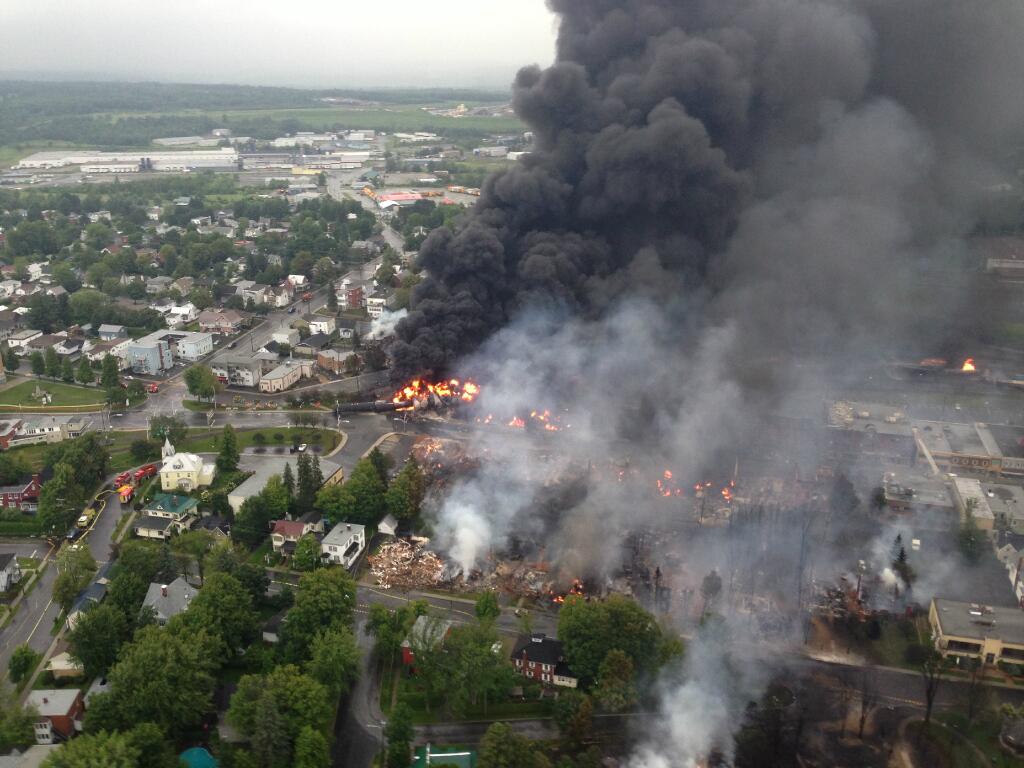Last week a jury rendered a not-guilty verdict in the criminal negligence trial of the three railway workers involved in the Lac-Mégantic tragedy in 2013. Forty-seven people were killed and the town centre was destroyed after an unattended 74-car freight train carrying Bakken crude oil rolled downhill into the Quebec town and derailed.
The trial result was a just decision given that these men, the last links in the accountability chain, were facing so many factors beyond their control, all of which failed that terrible night.
The citizens of Lac-Mégantic have been exceedingly gracious in their acceptance of the verdict. Many have expressed the view that the right people were not on trial.
In its wake, the government has an obligation to fulfil a number of long-overdue commitments to improving rail safety, and to the people of Lac-Mégantic.
First and foremost, its highest priority must be to ensure a rail bypass around the town gets built. It will be five years in July. No more procrastination or buck-passing from the federal government should be tolerated.
Trains carrying dangerous goods are still being parked at that same location on the track that slopes down steeply to what was once the town centre, and is still a vast open field. Unbelievably, the quickly rebuilt track curve is even sharper now than when the train derailed.
The bypass is a precondition for the people of Lac-Mégantic to feel safe again, to rebuild their lives and their community.
The trial was a distraction from the underlying causes of the disaster. The Transportation Safety Board report identified some, but not all contributing factors. There are many unanswered questions about what went on inside Transport Canada and related departments; about political interference and the actions of the industry.
An independent judicial inquiry is essential to uncovering the whole truth: what happened, why it happened and who is responsible, including at the highest policy levels. The institutional and policy breakdown must be brought to light, and changes made to prevent a recurrence.
Despite some improvements, Transport Canada remains captive to industry and lacking the resources to provide comprehensive rail safety oversight. The railways still set the rules: blocking, diluting, delaying or eliminating regulations that negatively affect their costs.
Oil-by-rail traffic declined in 2015-16, but as production increases and pipeline capacity bottlenecks loom, oil trains rumbling through our towns and cities are on the rise again.
Both diluted bitumen [dilbit) and Bakken shale are explosive products. Oil companies have not been required to remove their volatile components prior to transport. This is unacceptable. Despite the transport minister’s accelerated phase-out of the old DOT 111 tank cars, the marginally safer tank cars currently hauling oil will not be fully replaced by the new strengthened models until 2025.
The increase in train runaways in recent years indicates ongoing problems with train securement practices. Most disturbingly, railways continue to have too much freedom to self-regulate: power to triage safety risks against costs.
The federal government failed to meet its primordial obligation to protect the safety of its citizens from the dangers of transporting oil-by-rail. The people of Lac-Mégantic paid the horrific price. As they struggle to rebuild and ensure no other community has to suffer as they have, there can be no more prevaricating. As a society, we owe them justice.
Bruce Campbell is former executive director of the Canadian Centre for Policy Alternatives. In 2015, he was awarded a Law Foundation of Ontario Fellowship for his work on the Lac-Mégantic disaster, and spent 2016 at the University of Ottawa law faculty. He is currently writing a book on this tragedy.
Photo: Sûreté du Québec/Wikimedia Commons
Like this article? rabble is reader-supported journalism. Chip in to keep stories like these coming.




